AgWired coverage of IFAJ 2009 is sponsored by:

 and
and 
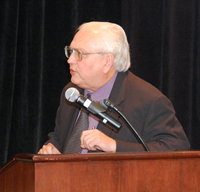 It was the Flinchbaugh-Stenholm show Sunday morning at the first combined session for the IFAJ Congress and the Ag Media Summit. A full house was entertained by the musings and mutterings of “The Great Debate” between former Texas congressman Charlie Stenholm and retired K-State ag economist Barry Flichbaugh.
It was the Flinchbaugh-Stenholm show Sunday morning at the first combined session for the IFAJ Congress and the Ag Media Summit. A full house was entertained by the musings and mutterings of “The Great Debate” between former Texas congressman Charlie Stenholm and retired K-State ag economist Barry Flichbaugh.
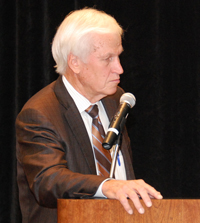 The crowd had lots of questions for the two after their debate over ag and international trade policy, as did several reporters after the fact. It was interesting to hear the international journalists ask questions about climate change policy and animal rights activism. Our own Joanna Schroeder and Kansas Ag Network reporter Greg Akagi also interviewed them both.
The crowd had lots of questions for the two after their debate over ag and international trade policy, as did several reporters after the fact. It was interesting to hear the international journalists ask questions about climate change policy and animal rights activism. Our own Joanna Schroeder and Kansas Ag Network reporter Greg Akagi also interviewed them both.
Listen or download to a mix of reporter interviews with Charlie Stenholm here – international questions followed by Greg and Joanna’s interview:

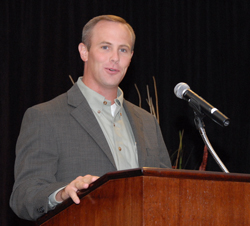 During an interview after his luncheon address, Drew DeBerry told me that he was not surprised with the reaction to some of his comments and the questions posed by the international journalists. “I’m impressed at the interest they have in our domestic policies here in the United States,” he said. “I’m encouraged that means there is an interest around the world in better understanding US domestic policies because we have to understand each others policies if we’re going to have fair trade.”
During an interview after his luncheon address, Drew DeBerry told me that he was not surprised with the reaction to some of his comments and the questions posed by the international journalists. “I’m impressed at the interest they have in our domestic policies here in the United States,” he said. “I’m encouraged that means there is an interest around the world in better understanding US domestic policies because we have to understand each others policies if we’re going to have fair trade.”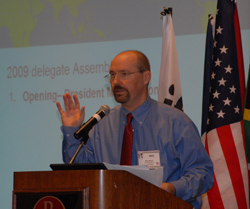 Mike reported on the further development of the
Mike reported on the further development of the  With a free day before the real business of the
With a free day before the real business of the 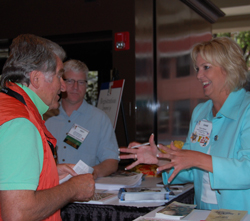 Congress organizer Diane Johnson has been really busy today getting people to where they want to go, since this is her home turf, and she is doing a fabulous job! Many of the visitors, including those of us from the United States, can find a lot to do and see just on foot around the conference hotel. Downtown Ft. Worth is a very beautiful area with lots of local attractions like the Sid Richardson Museum featuring paintings and art of the Old West and plenty of wonderful restaurants. Diane says we have 700 people total for the IFAJ/AMS combined event, with 130 of them from other countries.
Congress organizer Diane Johnson has been really busy today getting people to where they want to go, since this is her home turf, and she is doing a fabulous job! Many of the visitors, including those of us from the United States, can find a lot to do and see just on foot around the conference hotel. Downtown Ft. Worth is a very beautiful area with lots of local attractions like the Sid Richardson Museum featuring paintings and art of the Old West and plenty of wonderful restaurants. Diane says we have 700 people total for the IFAJ/AMS combined event, with 130 of them from other countries.  It’s always nice to have a good working press room with internet access at any event where there are journalists at work and the
It’s always nice to have a good working press room with internet access at any event where there are journalists at work and the 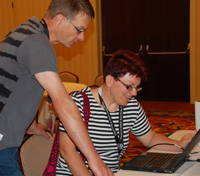 As I sit here doing posts, I have been hearing many languages around me. That is why this is such a great event for agricultural journalists here in the United States to be able to interact with their colleagues in other countries. This is the first time in many years the Congress has been held in the United States, and the first time it has ever been held in conjunction with the Ag Media Summit, so it allows more of our IFAJ members to attend.
As I sit here doing posts, I have been hearing many languages around me. That is why this is such a great event for agricultural journalists here in the United States to be able to interact with their colleagues in other countries. This is the first time in many years the Congress has been held in the United States, and the first time it has ever been held in conjunction with the Ag Media Summit, so it allows more of our IFAJ members to attend. 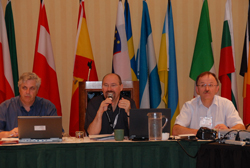 The executive committee of the
The executive committee of the 
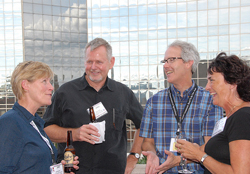 It was an absolutely gorgeous day in Ft. Worth today as our international visitors began arriving for the
It was an absolutely gorgeous day in Ft. Worth today as our international visitors began arriving for the  It sounds like a certain kind of soy music but it isn’t. It’s actually great advice about soybean rust and aphids.
It sounds like a certain kind of soy music but it isn’t. It’s actually great advice about soybean rust and aphids. A tasty sounding addition to your summer grill is American lamb. It looks like the competition was fierce when the American Lamb Board held their summer grilling recipe contest.
A tasty sounding addition to your summer grill is American lamb. It looks like the competition was fierce when the American Lamb Board held their summer grilling recipe contest.